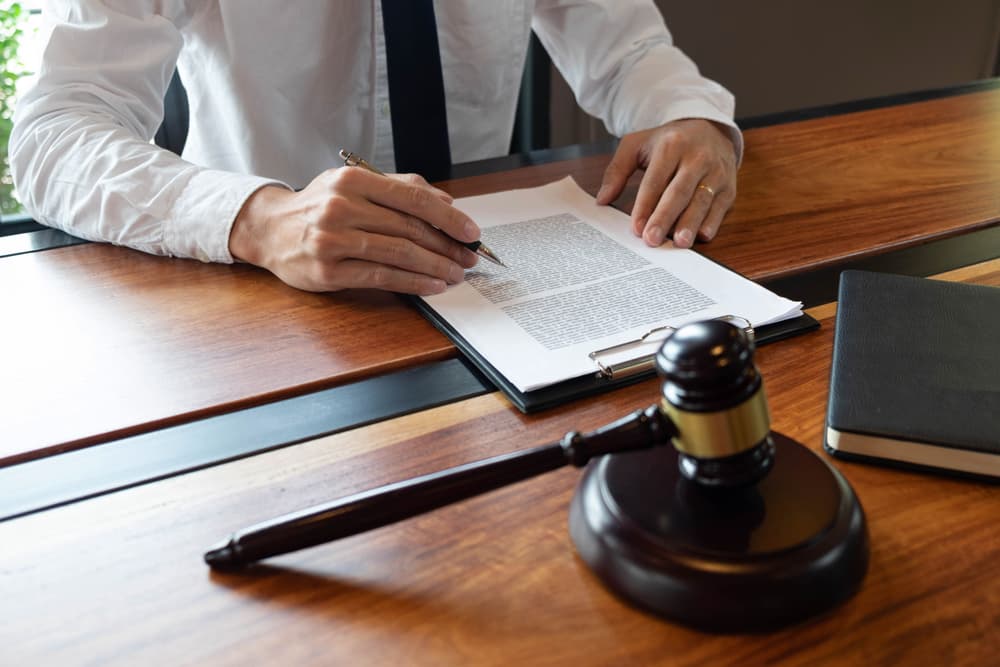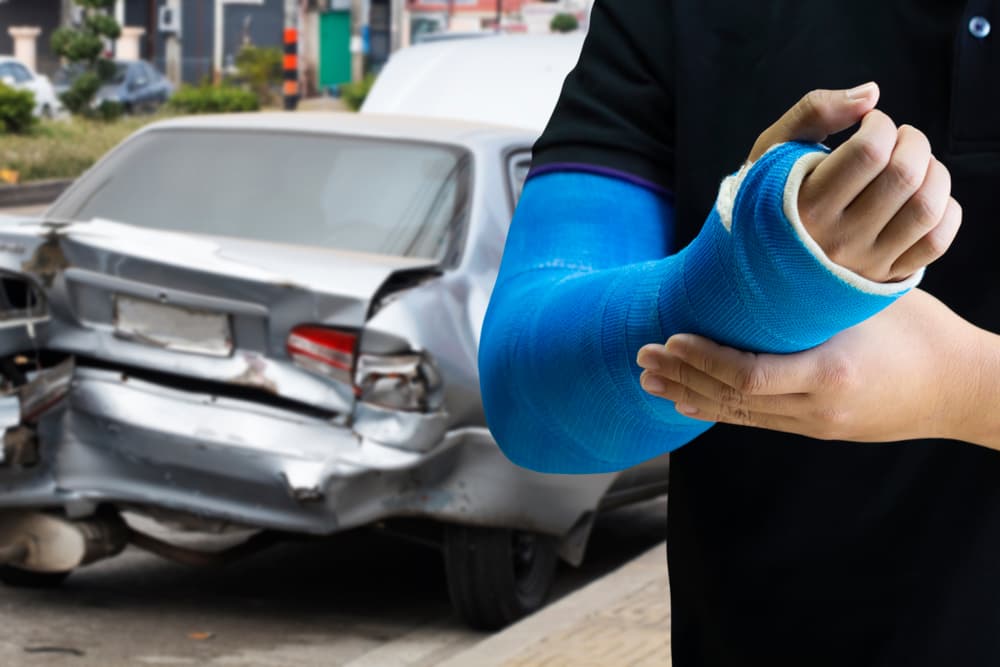If you sustained injuries in an occurrence that resulted from someone else’s reckless or careless behaviour, you need to retain a knowledgeable personal injury lawyer to represent you as quickly as possible. At your first meeting with a potential lawyer, there are certain questions that you should ask – especially those pertaining to their level of experience with personal injury cases and their track record of success.
A skilled Edmonton personal injury lawyer can handle every step of the claims-filing and litigation processes for you, maximizing your chances of recovering a favourable monetary award for your injuries.
What Should You Ask a Personal Injury Lawyer?
After suffering injuries due to someone else’s negligence, it’s crucial to ask your personal injury lawyer the right questions to ensure you have the best representation and understanding of your case. Here are some important inquiries that you should ask a prospective lawyer during your initial consultation:
What is your experience with personal injury cases?
Knowing your lawyer’s background and experience helps you gauge their familiarity with the complexities of personal injury law. Look for a lawyer with a track record of handling cases that are similar to yours.
How will you handle my case?
Understanding the legal process and the steps your lawyer plans to take will give you a clear picture of what to expect. Ask about timelines, paperwork, and potential challenges in your case.
What types of compensation can I pursue in my case?
Different injuries may warrant various forms of compensation. Inquire about the types of damages you can pursue, such as lost income, pain and suffering, mental distress and more.
What is the potential value of my personal injury claim or lawsuit?
While it’s challenging to predict an exact figure, a seasoned lawyer can provide you with a rough estimate based on similar cases they’ve handled. This insight helps you manage expectations and plan accordingly.
How do you communicate with clients?
Communication is key during legal proceedings. Ask about the lawyer’s preferred mode of communication, how often you can expect updates, and who will be your primary point of contact.
What are the potential legal challenges in my case?
Understanding the possible hurdles in your case allows you to prepare mentally and emotionally. A transparent discussion about challenges demonstrates your personal injury lawyer’s honesty and experience.
Have you worked with insurance companies before?
Dealing with insurance companies is a common aspect of personal injury cases. A lawyer experienced in negotiations with insurance companies can be beneficial for securing fair compensation.
What are your fees and payment structure?
Knowing the financial aspects of hiring a lawyer is crucial. Ask about their fee structure, whether it’s contingency-fee-based or hourly, and if there are additional costs associated with your case.
Will my case go to trial?
While many cases settle outside of court, it’s essential to understand the likelihood of your case going to trial. A lawyer who is prepared for trial demonstrates a commitment to pursuing your best interests.
Can you provide references from past clients?
Requesting references allows you to hear about other clients’ experiences with a prospective lawyer. Positive testimonials can instill confidence in your decision to hire them.
Asking these questions empowers you to make informed decisions about your legal representation and ensures that you and your lawyer are on the same page regarding your personal injury case.
How Can a Personal Injury Lawyer Help Throughout My Case?

An experienced personal injury lawyer plays a crucial role in assisting you throughout a claim or lawsuit, providing valuable support and experience at every stage of the legal proceedings.
First, a skilled lawyer will carefully assess the details of your case, listening to your account of the incident and gathering essential information. This thorough understanding allows them to determine the strength of your claim and plan a strategic approach tailored to your specific situation.
Once your lawyer establishes the viability of your case, they can guide you through the legal process. This involves handling complex paperwork, meeting deadlines, and ensuring that all necessary documentation is accurate and in order. Navigating legal procedures can be overwhelming, but a knowledgeable lawyer is there to simplify the process for you.
Negotiating with insurance companies – or the opposing party – is another critical aspect of a personal injury case. An experienced lawyer will advocate for your rights and fair compensation, using their negotiation skills to secure the best possible outcome. This ensures that the insurance company does not take advantage of you during settlement discussions.
If negotiations do not lead to a satisfactory resolution, your lawyer is prepared to take your case to court. At trial, they can present evidence on your behalf and argue your case convincingly in front of a judge or jury. This step requires experience, and having a seasoned lawyer by your side ensures that you are well-represented throughout the litigation process.
Communication is also key throughout your case. A dedicated personal injury lawyer will keep you informed about the progress of your claim, explaining legal concepts and updates in a clear and understandable manner. This open communication ensures that you stay actively involved in the decision-making process.
An experienced lawyer also plays a pivotal role in assessing the value of your claim. They will consider various factors, such as your lost income and pain and suffering, to determine a fair and comprehensive compensation amount.
In essence, an experienced personal injury lawyer provides invaluable assistance by assessing your case, guiding you through legal procedures, negotiating on your behalf, representing you in court if necessary, and ensuring transparent communication. Their experience is essential in securing fair compensation for the injuries and losses you suffered due to someone else’s negligence.
How the Negligence of Others May Cause Various Types of Accidents and Injuries
When people act without care or responsibility, they can cause both motor vehicle accidents and premises accidents. Negligence – or not being careful – plays a big role in how these incidents unfold.

In motor vehicle accidents, negligence often involves distracted driving. When drivers take their attention away from the road to text, talk on the phone, or engage in other activities, they become more prone to causing accidents. Speeding is another form of negligence, as it reduces the time a driver has to react to unexpected roadway situations. Neglecting to follow traffic rules, like running red lights or stop signs, is a common way that negligence leads to roadway accidents.
Additionally, poorly maintained vehicles contribute to accidents. If a driver neglects to service their brakes, tires, or other crucial vehicle components, it increases the likelihood of a breakdown or malfunction while driving. Negligence in vehicle maintenance can turn a routine trip into a dangerous situation for both the driver and others on the road.
In premises accidents, negligence often stems from inadequate maintenance. Property owners have a responsibility to keep their premises safe for visitors. Failing to address hazards like uneven walkways, slippery floors, or broken stairs can result in trips and falls. Lack of proper warning signs and poor lighting further exacerbate these risks, making it more likely for serious accidents to occur.
Negligence also plays a role in workplace accidents. Employers who fail to provide a safe working environment or proper training contribute to the occurrence of accidents on their premises. This lack of responsibility can lead to injuries ranging from slips and falls to more severe incidents.
In both vehicle and premises accidents, negligence is the driving force. Whether it’s a driver not paying attention on the road or a property owner neglecting necessary maintenance, the failure to act responsibly can have severe consequences. If you suffered injuries in one of these types of accidents, a knowledgeable personal injury lawyer can handle every step of the legal process for you and pursue the financial recovery you deserve.
Evidence Necessary to Prove a Personal Injury Case
Successfully proving a personal injury claim or lawsuit requires gathering compelling evidence that demonstrates the responsible party’s negligence and the full extent of your injuries. Evidence is crucial in establishing a strong case, and various types contribute to building a persuasive argument.
First, medical records are a fundamental component. These documents provide a detailed account of your injuries and the treatments you received. Medical records also serve as concrete evidence of the direct effect the incident had on your well-being, supporting your claim for compensation.
Witness statements play a significant role as well. Eyewitnesses who observed the accident can provide valuable perspectives and firsthand accounts of what transpired. Their statements can corroborate your version of events and strengthen the credibility of your case.
Photographic evidence can also be compelling in illustrating the scene of the incident. Pictures of the accident site, your injuries, and any property damage help to create a visual narrative for the court or insurance company to consider. A picture can often convey details that words alone may struggle to capture.
Additionally, documentation of any communication related to the incident is vital. This includes emails, text messages, or letters exchanged with the responsible party or their insurance company. Such correspondence can serve as evidence of acknowledgment or admission of fault, which can be crucial in establishing liability.
Expert opinions may also bolster your case significantly. Testimony from professionals in relevant fields, such as medical experts or accident reconstruction specialists, can provide important insights. Their opinions can also clarify complex aspects of your case and strengthen your argument in court.
Finally, a personal injury diary or journal can be a powerful tool. Recording your thoughts, emotions, and the daily challenges you face due to your injuries provides a personal perspective. This narrative can also help to convey the non-economic damages you suffered, such as pain, loss of life enjoyment, and emotional distress.
A combination of medical records, witness statements, photographic evidence, communication documentation, expert opinions, and a personal injury diary collectively builds a strong case. Each piece of evidence contributes to showcasing the negligence of the responsible party – and the tangible and intangible effects of your injuries – reinforcing the strength of your personal injury claim.
Recovering Damages in a Personal Injury Claim or Lawsuit
When individuals pursue a personal injury claim or lawsuit due to someone else’s negligence, they may be eligible for different damages to compensate for their losses. These damages can be categorized into economic damages, punitive damages, and non-economic damages.
- Economic Damages – Economic damages are tangible losses that come with a clear monetary value. This category includes compensation for lost income due to time away from work because of the injury. Additionally, economic damages may cover loss of earning capacity if the victim’s injuries prevent them from returning to the same job or line of work after their accident. These damages aim to reimburse the injured party for measurable and verifiable economic hardships.
- Non-economic Damages – Non-economic damages are less tangible losses that don’t have a direct monetary value. This category includes compensation for pain and suffering, emotional distress, loss of consortium, and diminished quality of life resulting from the injuries. Unlike economic damages, non-economic damages can be challenging to quantify precisely. They address the more subjective and personal effects of the injury, acknowledging that the harm extends beyond mere financial losses.
- Punitive Damages – Punitive damages serve a different purpose than economic damages. While economic damages focus on compensating the victim for their losses, punitive damages are intended to punish the at-fault party for their egregious actions. These damages are not always available and usually come into play when the at-fault party’s behaviour is particularly reckless or intentional. The aim is to deter similar wrongful behaviour in the future, emphasizing the importance of responsible actions and discouraging negligence.
Personal injury claims or lawsuits provide avenues for individuals to seek compensation for various types of damages. Together, these types of damages strive to provide a comprehensive remedy for the physical, emotional, and financial consequences of personal injuries resulting from someone else’s negligence.
Speak with an Experienced Personal Injury Lawyer in Your Area Today

If you sustained injuries due to someone else’s negligence in a recent accident, a personal injury lawyer can be immensely helpful throughout the process. Your lawyer can file a timely claim on your behalf, litigate your case in the court system, or represent you at legal proceedings, including depositions and jury trials. Your lawyer will do everything they can to maximize your overall compensation award so that you become whole again after your accident.
